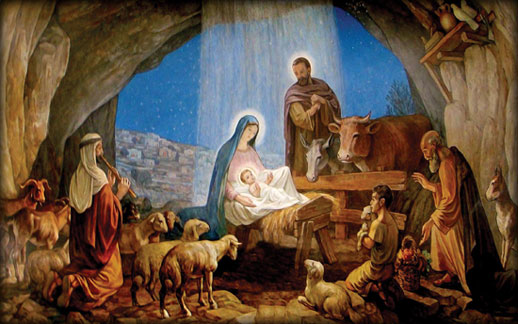A meaningful Christmas
By Lionel Wijesiri
Every year, around this time, most people’s thoughts turn to
Christmas. It is the time when professing Christians are supposed to
focus on Jesus Christ. After all, it is the ‘Christ-mass’ season!
Traditionally, Christmas is thought to be a wonderful time, with its
focus on giving, family togetherness, beautiful music and decorations,
feasting on special foods and singing Christmas carols. These all bring
warm feelings to those who celebrate it.
 |
|
Christmas is an annual
commemoration of the birth of Jesus Christ |
On Tuesday evening, when you gather around the Christmas tree or
stuff goodies into gift boxes, you’re beginning to take part in
traditions that stretch back thousands of years - long before
Christianity entered the mix. Pagan, or non-Christian, traditions show
up in this beloved winter holiday, a consequence of early church leaders
melding Jesus’ nativity celebration with pre-existing mid-winter
festivals. Since then, Christmas traditions have warped over time,
arriving at their current state a little more than a century ago.
Let us go through this story again.
History
Saturnalia was an ancient Roman festival in honour of the deity
Saturn, held on December 17 of the Julian calendar and later expanded
with festivities through December 23. The holiday was celebrated with a
sacrifice at the Temple of Saturn in the Roman Forum and a public
banquet, followed by private gift-giving, continual partying, and a
carnival atmosphere that overturned Roman social norms. The poet
Catullus called it “the best of days.”
In Roman mythology, Saturn was an agricultural deity who reigned over
the world in the Golden Age, when humans enjoyed the spontaneous bounty
of the earth. The renewal of light and the coming of the New Year was
celebrated in the later Roman Empire at the Dies Natalis of Sol
Invictus, or the ‘Birthday of the Unconquerable Sun’, on December 25.
As Christians spread their religion into Europe in the first
centuries AD, they ran into people living by a variety of local and
regional religious creeds. Christian missionaries lumped all of these
people together under the umbrella term pagan. The term is related to
the Latin word meaning ‘field’. The lingual link makes sense because
early European Christianity was an urban phenomenon, while paganism
persisted longer in rustic areas.
Early Christians wanted to convert pagans, but they were also
fascinated by their traditions.
Christians of that period were quite interested in paganism. It was
obviously something they thought was a bad thing, but it was something
they thought was worth remembering. It’s what their ancestors did.
Perhaps, that’s why pagan traditions remained even as Christianity
took hold. The Christmas tree is a 17th-century German invention, but it
clearly derives from the pagan practice of bringing greenery indoors to
decorate in mid-winter. The modern Santa Claus is a direct descendent of
England’s Father Christmas, who was not originally a gift-giver.
However, Father Christmas and his other European variations are modern
incarnations of old pagan ideas about spirits who travelled the sky in
mid-winter. Despite the spread of Christianity, mid-winter festivals did
not become Christmas for hundreds of years.
According to some legends, the Christian celebration of Christmas was
invented to compete against the pagan festivals held in December. The
25th was sacred, not only to the Romans, but also to the Persians whose
religion of Mithraism was one of Christianity’s main rivals at that
period in time.
 |
|
For some, Christmas
means just partying and fun |
In 350 AD, Julius I (Bishop of Rome) selected December 25 as the
observance of Christmas. This date was made official in 375 AD, when it
was formally announced that the birth of Jesus would be honoured on this
day.
The announcement also allowed some of the older pagan festivities
(such as feasting, dancing and the exchange of gifts) to be incorporated
into the observance of Christmas. The use of greenery to decorate homes
continued to be prohibited as pagan idolatry, but, over the centuries,
this too became an accepted custom of the festivities.
That is a brief history of Christmas. As we can see, it is a mistake
to say that the modern Christmas traditions come directly from
pre-Christian paganism. However, we would be equally wrong to believe
that Christmas is a modern phenomenon.
Christian sermon
Last year, during the Christmas season, this writer was at Singapore
and had the opportunity to listen to a purposeful public Christian
sermon. The topic was ‘The Meaning of Christmas: Look Deeper’. The
writer doesn’t recollect the name of the Christian priest who delivered
the sermon, but scanning through his notes, the writer remembers the
gist of the speaker’s presentation. His five-point formulae is food for
thought for any Christian who wishes to reconnect with the original
purpose and meaning of Christmas.
* Make it a time for meaningful fellowship
At Christmas, we usually spend more time with family, friends, and
co-workers than at any other time of the year. Real fellowship occurs
when there is heart-to-heart sharing. For fellowship to happen, we must
open and reveal ourselves to one another, talking about what we care
about most. When real fellowship happens, families and friends grow
closer to each other. But it doesn’t happen automatically. It happens
when we intentionally ask meaningful questions, and then take the time
to listen to one another.
* Make it a time for personal growth
Many people dread their annual family gathering because it reminds
them of unresolved hurts, unsettled conflicts, painful memories and
uncomfortable relationships. Because all families are composed of
imperfect people, we hurt one another - sometimes intentionally and
sometimes, not. In a purpose-driven Christmas, you use the event as an
opportunity for reconciliation. Jesus came to restore our broken
relationships with God and with one another. That is why, for us, the
purpose of Christmas is to make peace, which needs courage, patience,
openness, initiative and maturity.
* Make it a time for service
Everyone knows the spirit of Christmas is giving. But the best gifts
are often ones you can’t wrap in paper. They are gifts of service -
where we offer our time, our talents, our connections, our ideas or our
energy to serve those in need around us. Do simple acts of kindness
during this season. It might be running an errand, picking up a package,
offering to babysit, loaning some decorations, making phone calls for
your church, or taking a meal to someone who is housebound.
* Make it a time for joyful worship
Certainly, you’ll want to make time for worship as you thank God for
His greatest Christmas gift to you: He sent a Saviour. You can worship
God during your everyday activities. You can do this by performing those
activities as if you were doing them for God and carrying on a continual
conversation with Him while you do them.
* Make it a time for cheerful sharing
During the Christmas season, you’ll find that people are more open to
discussing spiritual issues than at any other time of the year. So share
the message with your family and friends. Reach out beyond the church
walls. It’s the best news they’ll ever hear!
So, amidst the din and tinsel as you fix the Christmas tree, let a
new-born love enfold you, embrace you, uphold you. That’s the true idea
of Christmas and that’s what Christmas should really mean to you!
|

